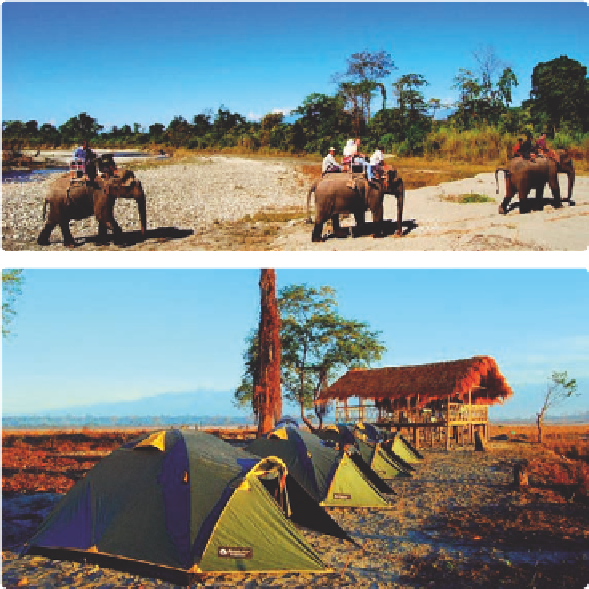Travel Reference
In-Depth Information
452 The GreaT IndIan elephanT
SafarI, IndIa
Elephant rides are a common enough tourist
activity in India, but an elephant safari - riding
tamed elephants from village to village or camp
to camp - is a much rarer experience, and one
that benefits animals whose survival would
otherwise be at risk.
For years the Khampti tribe, located in the
remote northeastern region of Arunachal
Pradesh, used their elephants for timber felling,
but a subsequent government restriction has
meant that many Khampti
mahouts
(elephant
trainers) are out of a job, with little incentive to
protect the animals they no longer work with.
By organizing safaris, Help Tourism aims to
support elephants and villagers living round
the village of Chongkham. On their eleven-day
Great Indian Elephant Safari, guests spend four
days exploring the rivers, hills and once-felled
forests with the
mahouts
as guides. To ensure
their well-being, the elephants are ridden for
no longer than three hours each day, with their
physical and mental conditions kept under
constant surveillance.
But it's not all about the pachyderms. The tour
also includes birdwatching, a boat expedition
on the Lohit River and plenty of nature trails
to follow. A highlight is staying in the Khampti
villages; here you'll learn about the villagers'
Buddhist culture and customs, see intricate
Khampti weaving, witness the traditional peacock
dance and taste local cuisine, cooked solely with
herbs and plants harvested from the forest. These
distinct customs have remained remarkably
intact as India has developed relentlessly around
the Khampti, and now, thanks to Help Tourism,
the elephants and the livelihoods of their
mahouts
are being saved too.
Taking a break at the safari
camp; Once employed as
timber fellers, these elephants
along with their mahouts now
happily enable tourists to
see the more remote parts
of Arunachal Pradesh; Camp
accommodation; The Khampti
musicians and dancers
Need to know
The trip starts and ends in
Kolkata and includes visits to both the Manas and
Sundarbans reserves; likely costs are US$1500-
2000 per person. For further information visit
W
www.helptourism.com;
T
+91 (0) 983 103 1980.





















Search WWH ::

Custom Search